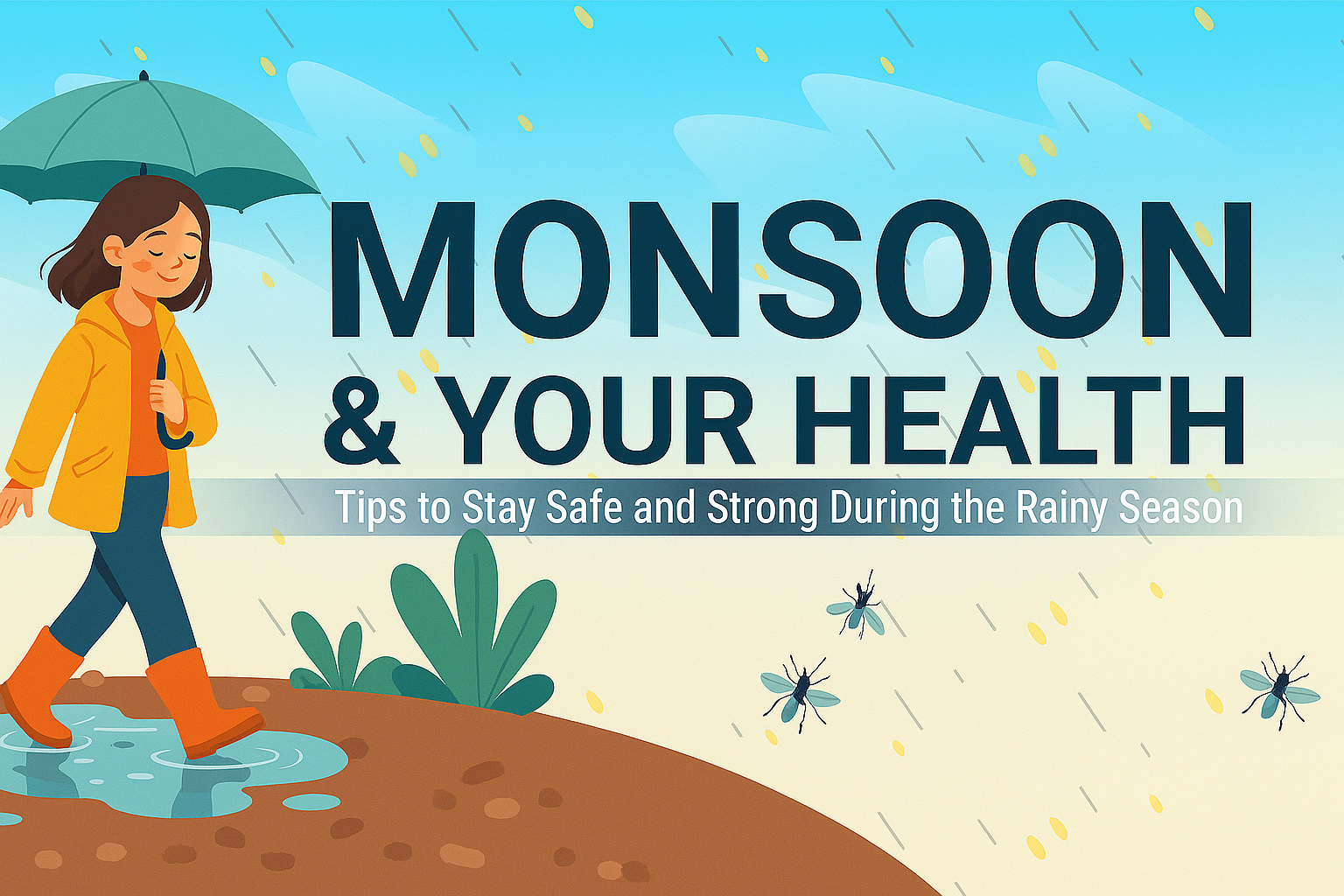HEALTH TIPS FOR MONSOON SEASON

Rainy Season Health Tips You Shouldn’t Ignore
The rainy season brings cool breezes, Rainy Season HealthTips You Shouldn’t Ignore, fresh greenery, and a much-needed break from the
scorching summer. But along with the pleasant weather, it also brings increased
chances of infections, allergies, and waterborne diseases. At Sree Latha
Hospital, Rajahmundry, we care about your health and well-being. That’s why
we’ve put together some simple but essential tips to help you and your family
stay healthy during this monsoon.
Why the Rainy Season Affects Health
During the monsoon, humidity levels rise and water
stagnation becomes common. This creates a perfect environment for the growth of
bacteria, viruses, and mosquitoes. People with weaker immune systems especially
children, elders, and pregnant women are more prone to seasonal diseases such
as:
Cold and Cough
Sudden changes in temperature, getting wet in the rain, or
sitting in damp clothes can lower your immunity and cause cold, sneezing, sore
throat, and cough. Children and elders are more vulnerable. It's important to
stay dry, drink warm fluids, and consult a doctor if symptoms persist for more
than 3 days.
Fever and Flu
Monsoon flu is common and spreads easily through air and
touch. Symptoms include high fever, body aches, chills, and tiredness. Flu
viruses thrive in humid environments, so keeping your surroundings clean and
avoiding crowded areas is important. If fever is continuous, consult your
physician immediately.
Diarrhea and Typhoid
Contaminated food and unclean drinking water are the main
reasons for diarrhea and typhoid. These conditions cause stomach pain, loose
motions, vomiting, and weakness. Boil your water, eat freshly cooked meals, and
avoid street food to stay protected. Early treatment can prevent serious
complications.
Dengue and Malaria
These mosquito-borne diseases increase significantly during
the rainy season due to stagnant water. Dengue causes high fever, rashes, and
body pain, while malaria leads to fever with chills and shivering. Prevent
mosquito bites by keeping your surroundings clean and using repellents or nets.
Skin Infections
The damp and humid weather often leads to fungal and
bacterial skin infections like rashes, itching, athlete's foot, or ringworm.
Wearing wet clothes or walking in muddy water increases the risk. Keep your
skin dry, change wet clothes quickly, and use antifungal powders or creams if
needed.
Health Tips to Follow During Monsoon
Drink safe, boiled water
Water contamination is one of the biggest reasons for stomach infections and typhoid during this season. Always drink boiled or RO-filtered water. Avoid using ice from outside or consuming drinks made with unclean water.-
Avoid eating outside food
During the rainy season, street food and uncovered snacks are more likely to be contaminated with dust, germs, and flies. It’s better to stick to home-cooked, fresh meals. Wash vegetables and fruits properly before use. -
Use mosquito protection
Standing water in buckets, pots, and open drains becomes a breeding ground for mosquitoes. These insects can spread dangerous diseases like dengue, malaria, and chikungunya. To prevent this:
- Use mosquito nets and repellents
- Wear full-sleeved clothing
- Clean water storage areas weekly
-
Keep your surroundings clean and dry
Damp and dirty surroundings can lead to fungal infections, especially on the skin. Make sure your house has proper drainage and ventilation. If your clothes or feet get wet, dry them immediately to prevent skin issues. -
Strengthen your immunity
Eat a balanced diet rich in vitamins and minerals. Include:
- Vitamin C-rich fruits (like oranges, amla, and lemon)
- Ginger, turmeric, and garlic for their anti-inflammatory properties
- Yogurt or buttermilk to improve gut health
Also, get enough sleep and exercise regularly to keep your body fit.
-
Carry rain gear and stay warm
Always keep an umbrella or raincoat handy. If you get wet, change into dry clothes quickly and avoid sitting under fans or ACs. This helps prevent colds and joint pains. -
Watch for warning signs
Don’t ignore symptoms like persistent fever, vomiting, rashes, breathing difficulty, or dehydration. Early diagnosis is key to preventing complications. Visit a doctor if symptoms last more than 2–3 days.
Whether it’s a child’s fever, a stomach infection, or dengue symptoms don’t wait. Walk into Sree Latha Hospital or call us for appointments.
Trust Sree Latha Hospital for Expert Monsoon Care
At Sree Latha Hospital, Rajahmundry, we’re ready to
treat and guide you through seasonal health issues. Our experienced doctors,
modern lab facilities, and 24x7 emergency care ensure that you get the best
support when you need it most.
Whether it’s a child’s fever, a stomach infection, or dengue
symptoms don’t wait. Walk into Sree Latha Hospital or call us for appointments.
Conclusion
The rainy season is a time to enjoy nature’s beauty, but
it’s also important to stay alert and take care of your health. By following
these simple tips, you can protect yourself and your family from common monsoon
illnesses. If you notice any health issues like fever, infections, or stomach
problems, don’t wait visit Sree Latha Hospital for safe, expert care.
If you need expert medical advice or treatment this rainy season, don’t hesitate to contact us. Our healthcare professionals are here to help you stay safe and healthy throughout the monsoon.
